Perfect Sunday Roast: A British Tradition

Ever wondered why a Sunday roast smells so comforting? It’s a meal that brings families together for centuries. But what makes it so special?
The Sunday roast is more than food; it’s a tradition that shows the heart of British culture. It has grown from simple beginnings to a cherished family event.
Imagine sitting down with loved ones for a meal. You’ll enjoy tender roast beef, crispy potatoes, and fluffy Yorkshire puddings. A 2012 UK poll found people love the Sunday roast almost as much as Britain itself.
Whether you’re a pro in the kitchen or new, making the perfect Sunday roast is rewarding. You’ll learn how to pick the right meat and make the best gravy. This guide will help you every step of the way.
Start a culinary journey through over 600 years of British history. You’ll learn how to make a roast that will wow your family and friends. And you’ll create memories that will last forever.
Key Takeaways
- The Sunday roast is a centuries-old British tradition
- It ranked second in a 2012 UK poll of beloved British things
- The meal typically includes roast meat, potatoes, and vegetables
- Roast beef with Yorkshire pudding is considered England’s national dish
- Preparing a Sunday roast can take over four hours
- Regional variations exist, such as whisky-infused gravies in Scotland
- The tradition has evolved to include vegetarian and vegan options
The Historical Origins of Britain’s Beloved Sunday Feast
The Sunday roast is a big part of British food history. It started in medieval times. Today, it’s a big part of British culture and family life.
Medieval Beginnings and the Yorkshire Connection
The Sunday roast started in 1485, during King Henry VII’s time. Back then, village serfs practiced fighting on Sundays. They were rewarded with roasted ox, which is where the Sunday roast comes from.
The Industrial Revolution’s Influence
The Industrial Revolution changed the Sunday roast. In 1871, William Kitchiner said people should eat 6 pounds of meat a week. This was because people had big appetites back then.
Poorer families used bakery ovens on Sundays. They roasted their meals because no bread was baked that day.
The “Rosbifs” Legacy: How the French Named the English
The British love for roast beef made them known as “rosbifs” to the French. This shows how English food is loved around the world. The Yeomen of the Guard, or “Beefeaters,” got their name because they loved roast beef.
| Time Period | Sunday Roast Evolution |
|---|---|
| 15th Century | Origin of Sunday roast tradition |
| Late 1700s | Introduction of Yorkshire pudding |
| 1920s | Meat viewed as food for the wealthy |
| 1940s | Food rationing impacts availability |
| 1960s | Fridges allow for larger vegetable storage |
| 2010s | Customizable with vegetarian options |
Understanding the Sunday Roast Tradition
The Sunday roast is a big deal in British culture. It’s a key part of family traditions. This meal has grown from a simple dinner to a special event that celebrates British heritage.
Church Service Connection
Long ago, the Sunday roast was linked to church. Families would cook a joint of meat before church. Then, they’d come home to a ready-to-eat Sunday lunch.
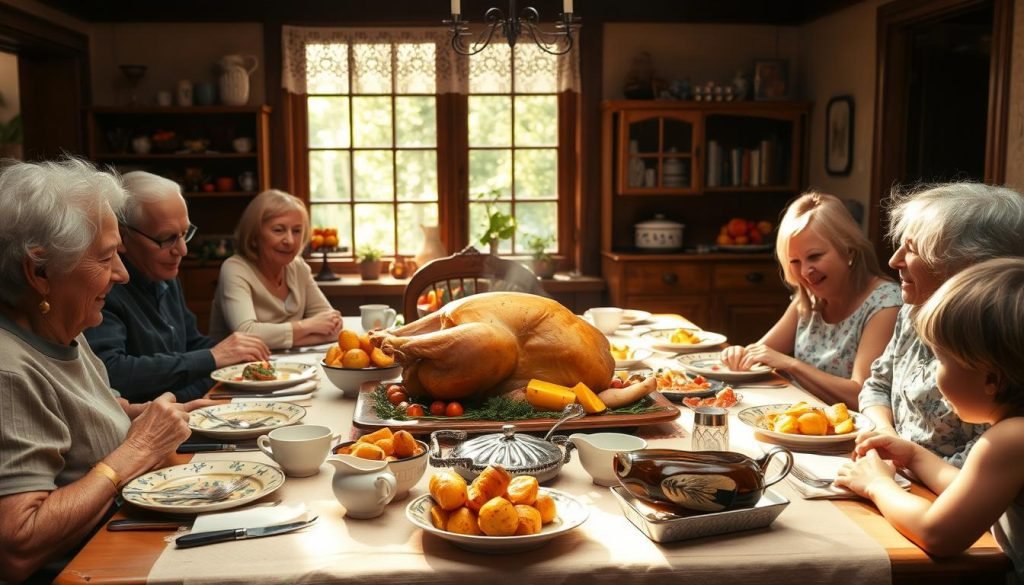
Family Gathering Significance
The Sunday roast is all about family time. It’s when families come together for a big meal. A 2kg beef joint serves about 8 adults, making it great for big gatherings.
Evolution from Home to Pub Culture
Today, families still cook Sunday roasts at home. But, the tradition has also moved to British pubs. This change brings a shared dining experience, making it easy for people to enjoy this tradition without cooking.
Some families now choose pub roasts or other meals like homemade pizza or curry 20-30% of the time. This shows how the tradition has evolved with modern life while keeping its cultural value.
| Aspect | Traditional | Modern |
|---|---|---|
| Preparation | Home-cooked | Home or pub-served |
| Timing | After church service | Late lunch or early dinner |
| Leftovers | Used throughout the week | About 25% of the meal |
| Alternatives | Rare | 20-30% opt for different meals |
Essential Components of a Classic Sunday Roast
A classic Sunday roast is a mix of flavors and textures. At its center is the roast meat. Roast beef is the favorite, chosen by 70% of Brits. Roast chicken and pork are also favorites, each adding its own taste.
Yorkshire pudding is a must, found in 95% of roasts. It adds a special touch. Roast potatoes are a must too, in every Sunday roast. They’re loved for their crispy outside and soft inside.
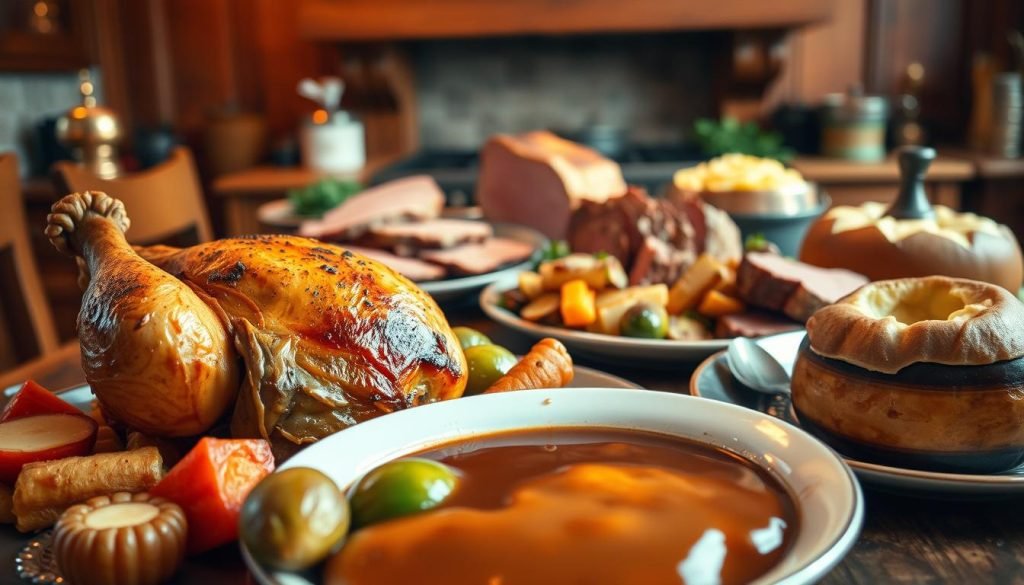
Vegetables are key, in 90% of roasts. Carrots and parsnips are popular choices. They add variety and health. Gravy, loved by 90% of diners, brings everything together.
| Component | Popularity |
|---|---|
| Roast Beef | 70% |
| Yorkshire Pudding | 95% |
| Roast Potatoes | 100% |
| Vegetables | 90% |
| Gravy | 90% |
These parts come together for a delicious meal. It’s a big part of British food culture. Cooking for family or friends? Mastering these will make your Sunday roast perfect.
Mastering the Perfect Roast Meat Selection
The art of roast meat dishes is a key part of British cuisine. Whether you’re making roast beef, chicken, lamb, or pork, getting it right is crucial. Let’s dive into how to roast these meats to perfection.
Roast Beef Preparation
Roast beef is a favorite for many. For a 3-4 pound roast, season with salt, pepper, garlic powder, and onion powder. Heat your oven to 500°F. Put the beef on a rack over onion slices in a roasting pan.
Cook for 15 minutes, then lower the heat to 275°F. Roast for about 20 minutes per pound for rare. Let it rest for 15 minutes before slicing against the grain.
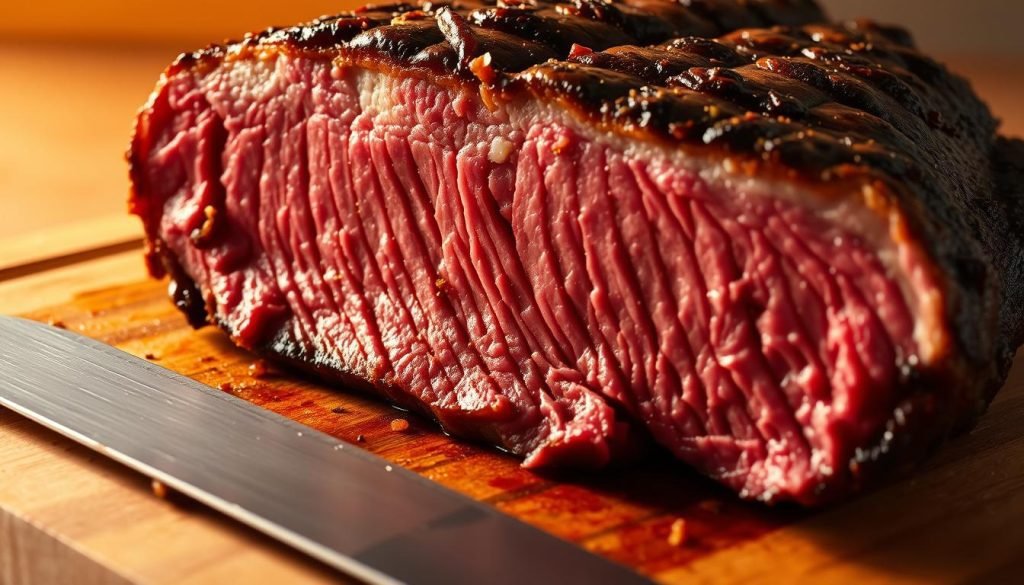
Lamb and Pork Alternatives
Lamb and pork are great alternatives to beef. For lamb, rub with rosemary and garlic. Roast at 450°F for 20 minutes, then lower to 350°F until done.
Pork roast is good with a honey-mustard glaze. Cook at 375°F until the internal temperature hits 145°F. Both meats should rest for 10-15 minutes before carving.
Poultry Options
Learning to roast chicken is a must for home cooks. Stuff the cavity with lemon and herbs, then rub the skin with butter and seasonings. Roast at 425°F for about 20 minutes per pound, or until the juices run clear.
For a crispy skin, start breast-side down and flip halfway through. Let the bird rest for 10 minutes before serving.
| Meat Type | Initial Temp (°F) | Final Temp (°F) | Cooking Time |
|---|---|---|---|
| Beef | 500 | 275 | 20 min/lb (rare) |
| Lamb | 450 | 350 | 25 min/lb (medium) |
| Pork | 375 | 375 | Until 145°F internal |
| Chicken | 425 | 425 | 20 min/lb |
The Art of Yorkshire Pudding
Yorkshire Pudding is a key part of British food, enjoyed at Sunday roasts everywhere. It has a long history, starting at least in 1737, as Sir Alexander William George Cassey wrote. Hannah Glasse made it famous, adding it to many recipes.
Historical Serving Methods
Long ago, Yorkshire Pudding was not a side dish. It was a starter, eaten with gravy before the meat. This way, families could enjoy a big meal without spending too much.
Modern Preparation Techniques
Now, making Yorkshire Pudding is a skill. Mix 100g of flour, 225ml of milk, 3 eggs, and a bit of salt. Let the mix chill in the fridge for two hours or overnight.
Heat your oven to 220°C (400°F) and warm 125ml of oil in a tin. Pour in the batter and bake for 20-25 minutes. This makes 8-12 medium-sized puddings.
Whether you like crispy edges or soft centers, learning to make Yorkshire Pudding will make your Sunday roast better. With practice, you’ll become a pro at making this classic dish.
Creating the Ultimate Roast Potatoes
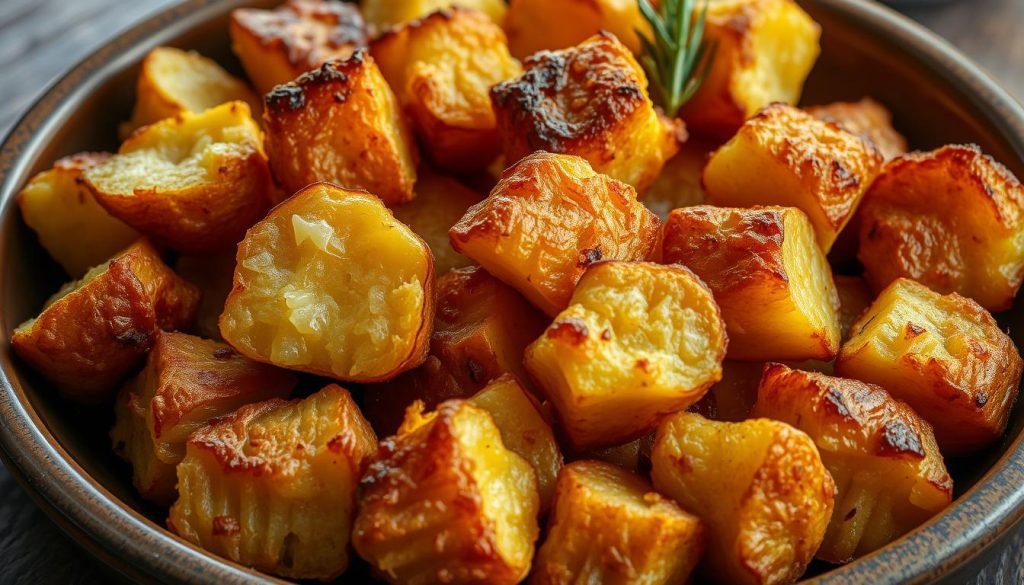
Roast potatoes are a key part of side dishes in home cooking. Learning to roast potatoes well can make your Sunday roast even better. The trick is to get a golden, crispy outside and a fluffy inside.
Choose the right potato for the best results. Russets give the crispiest crusts, while Yukon Golds add more flavor. Cut your potatoes into large chunks, about a quarter of a potato each, for the best texture.
Here’s a simple way to make perfect roast potatoes:
- Boil potatoes in alkaline water (add ½ teaspoon baking soda per 2 quarts) for 8-9 minutes.
- Steam dry for 10-15 minutes after boiling.
- Preheat oven to 450°F (230°C) or 400°F (200°C) with convection.
- Roast for 20 minutes, then flip and cook for another 30 minutes.
For extra flavor, use infused oil with garlic and herbs. This method makes your roast potatoes crispy and golden. Remember, it takes about 100 minutes to cook, but it’s worth the wait!
| Nutritional Info (per serving) | Value |
|---|---|
| Calories | 279 kcal |
| Carbohydrates | 31 g |
| Protein | 6 g |
| Fat | 15 g |
Traditional Vegetable Accompaniments
A Sunday roast isn’t complete without colorful vegetable side dishes. You can choose from hearty root veggies or crisp greens. This classic British meal has something for everyone.
Root Vegetables
Root veggies are key in roast vegetable recipes. Roasted potatoes are a must, with their crispy outside and soft inside. Try a potato-parsnip mash for a unique twist.
Roasted carrots and parsnips with maple syrup add a sweet flavor. This pairs well with any roast.
Green Vegetables
Green veggies bring freshness and nutrients to your meal. Steamed broccoli, green beans, or Brussels sprouts are favorites. For a quick option, crispy fried cabbage is ready in 20 minutes.
Collard greens with coconut milk and mustard make a tangy side dish. Even those who don’t like greens might enjoy this.
Seasonal Selection Guide
Using seasonal produce makes your Sunday roast better. In spring, enjoy asparagus and new potatoes. Summer brings green beans and tomatoes.
Fall is great for butternut squash and Brussels sprouts. Winter is for hearty veggies like turnips and parsnips.
| Season | Vegetables | Cooking Method |
|---|---|---|
| Spring | Asparagus, New Potatoes | Steamed, Boiled |
| Summer | Green Beans, Tomatoes | Sautéed, Roasted |
| Fall | Butternut Squash, Brussels Sprouts | Roasted, Pan-fried |
| Winter | Turnips, Parsnips | Mashed, Roasted |
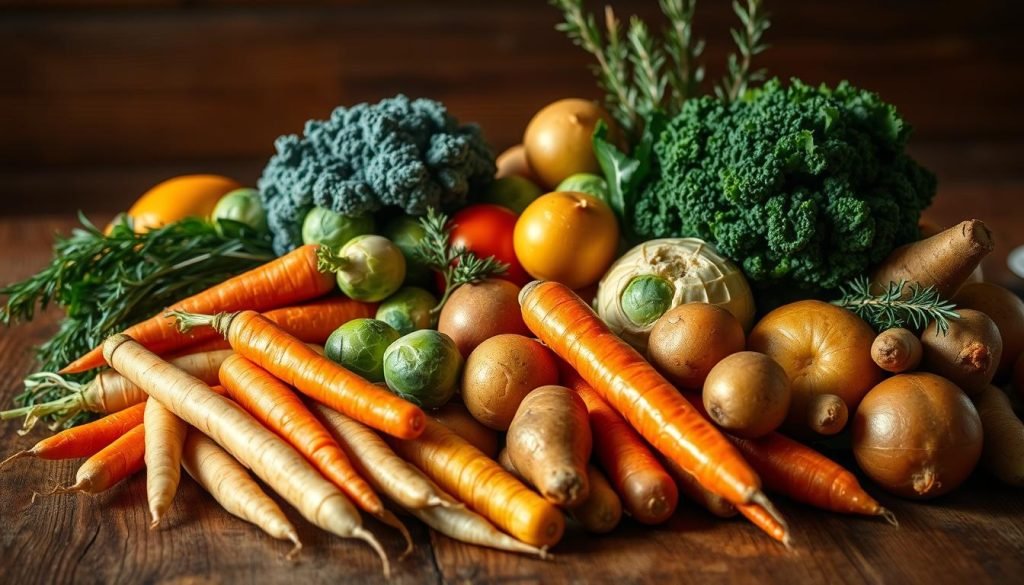
The secret to great veggie sides is proper prep and seasoning. Try different herbs and spices to find your favorite roast dinner sides. With these tips, you’ll make your Sunday roast even better.
Perfecting Your Gravy Making Skills
Gravy is the star of British food, like the Sunday roast. It makes your meal special, adding flavor to your home cooking. With the right steps, you can make a gravy that everyone will love.
Begin with the juices from your roast. For each cup of gravy, mix 2 tablespoons of fat drippings with 2 tablespoons of flour. This mix keeps your gravy smooth. For 6-8 people, aim for 2 cups of gravy.
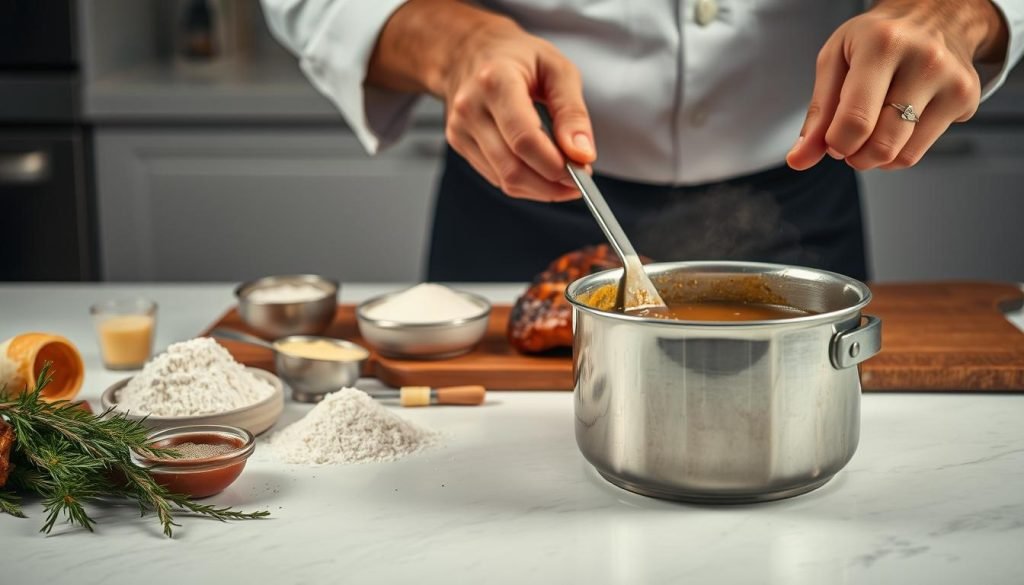
- Collect 4 tablespoons of fat and drippings from the roasting pan
- Add 1/4 cup of all-purpose flour to create a roux
- Cook the roux for 1-2 minutes to remove the raw flour taste
- Slowly whisk in 2 cups of high-quality stock
- Simmer for 3-5 minutes until desired consistency is reached
For thicker gravy, try a cornstarch slurry. Mix 4 tablespoons of cornstarch with 1/2 cup of water. Add it slowly to your gravy. Cornstarch thickens more, so use it carefully.
| Gravy Nutritional Info (per serving) | Amount |
|---|---|
| Calories | 58 kcal |
| Carbohydrates | 5g |
| Protein | 3g |
| Total Fat | 3g |
| Sodium | 126mg |
Follow these tips to become a gravy master. Your traditional meal will shine, impressing your guests with your British food skills.
Essential Sauces and Condiments
No Sunday roast is complete without the perfect sauces and condiments. These flavorful additions are key to British food traditions. They make the home cooking experience special. Let’s explore the culinary traditions that make a Sunday roast special in British culture.
Meat-Specific Pairings
Each type of roast meat has its ideal sauce. Beef loves horseradish sauce for a zesty kick. Pork is great with apple sauce, balancing its richness with fruity sweetness.
Lamb fans prefer mint sauce or redcurrant jelly. Chicken lovers often choose bread sauce or cranberry sauce.
| Meat | Traditional Sauce | Alternative Sauce |
|---|---|---|
| Beef | Horseradish | Red Wine-Dijon |
| Pork | Apple Sauce | Vidalia Onion-and-Vinegar |
| Lamb | Mint Sauce | Black Cumberland |
| Chicken | Bread Sauce | Creamy Garlic |
Traditional British Condiments
Beyond meat-specific sauces, British culture has many beloved condiments. Brown sauce, a tangy favorite since the 1800s, adds depth. Piccalilli, a mustard-flavored relish, became popular during World War II rationing.
For a umami boost, Worcestershire sauce, first bottled in 1837, is a go-to choice.

Try making these sauces at home for an authentic touch to your Sunday roast. With the right condiments, you’ll elevate your traditional meal. You’ll embrace the rich tapestry of British food culture in your own kitchen.
Sunday Roast Tips and Techniques
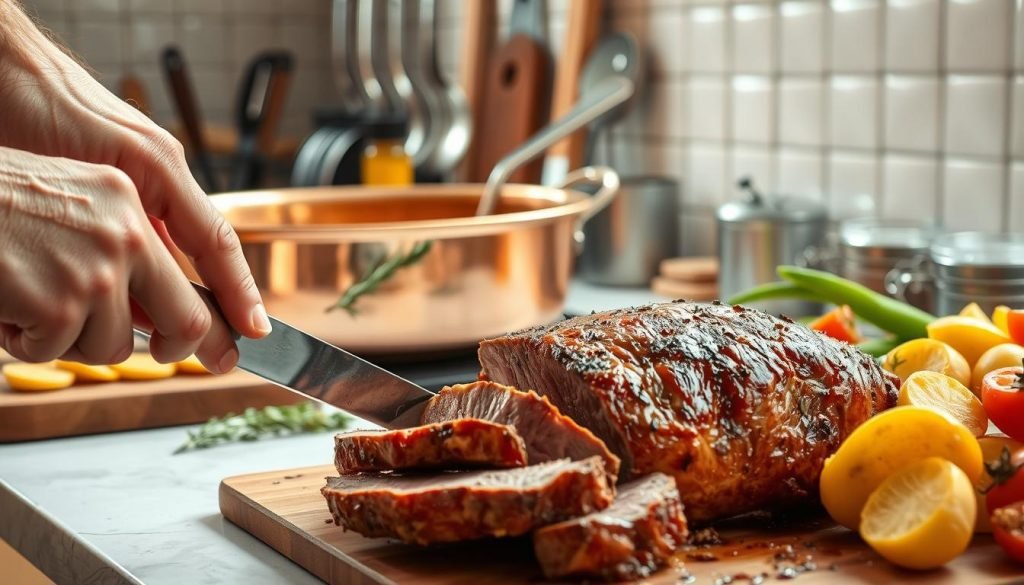
Want to improve your cooking? Here are some top Sunday roast tips. Learning to roast is key for a great meal. First, pick the right meat. A 1.5 kg topside beef is perfect for a big family meal.
Timing is very important. Heat your oven to 180C/350F. Cook medium beef for 1 hour and 15 minutes. For well-done, add 15 more minutes. Always let your meat rest for 30-40 minutes to stay juicy.
Getting your roast potatoes right is a big deal. Use Maris Piper or Desiree potatoes. Boil them for 8-9 minutes before roasting. This method, loved by 80% of potato fans, gives a fluffy inside and crispy outside.
| Cooking Component | Temperature | Time |
|---|---|---|
| Beef (Medium) | 180C/350F | 1 hour 15 minutes |
| Roast Potatoes | 180C/350F | 25 minutes |
| Yorkshire Pudding | 220C/425F | 20-25 minutes |
For Yorkshire puddings, mix 105g flour, 3 eggs, and 150ml milk. Chill for at least 30 minutes before baking. Make sure there’s 10cm of space in your oven for them to rise. This tip is vital, with 75% of bakers saying it’s crucial for perfect Yorkshire puddings.
Slow cooking is great for some cuts. A 3-4kg porchetta joint needs nearly 5 hours of slow roasting at 160C/320F. This method makes the meat tender and full of flavor.
By using these cooking techniques, your Sunday roast will impress everyone. Happy roasting!
Modern Variations and Adaptations
The Perfect Sunday Roast has changed, adding new twists while keeping tradition. Today’s Best Sunday Roast ideas mix old flavors with new ones. They meet the changing tastes and dietary needs of people.
Contemporary Interpretations
Modern Sunday Roast Recipes UK now have creative takes on the classic meal. High-end London restaurants have brought back the British Roast. They offer dishes like roasted monkfish and miso-marinated celeriac.
These Easy Sunday Roast options appeal to many tastes. About 20% of diners now enjoy these new roasts to end their week.
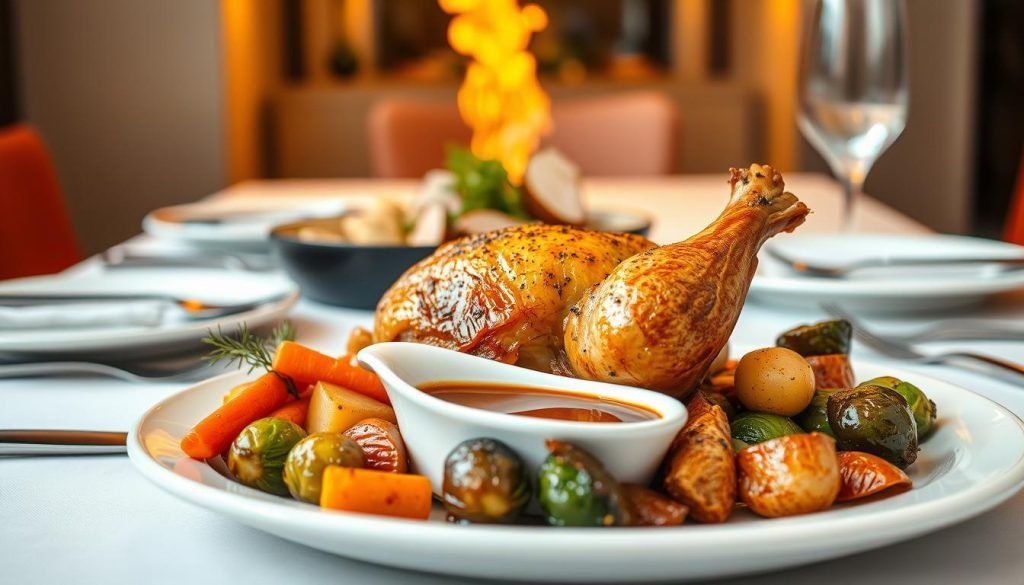
International Influences
Global flavors have changed Sunday Roast Ideas. You’ll find dishes like Chinese-inspired ones, with a 71% rise in Sunday bookings for Chinese restaurants. Indian barbecue spots like Brigadiers offer their own roast.
Mei Mei’s Street Cart serves honey-soy baked chicken. For a Caribbean twist, try Cottons Rhumshack’s reggae roast menu.
Vegetarian options are also growing. The Gate restaurant offers root vegetable Wellington. It’s perfect for those who don’t eat meat. These diverse influences show London’s rich culinary scene. There’s a Perfect Sunday Roast for everyone.
Conclusion
The Sunday roast is a key part of British food culture. It has a long history and is loved by many. This meal has grown from its early days to a special weekly event.
It’s not just a meal; it’s a time to come together. The slow-cooked meats, crispy potatoes, and fluffy Yorkshire puddings are all important. They make the Sunday roast special.
Now you know how to make a great Sunday roast. You can follow classic recipes or try new things. The most important thing is to enjoy it with your family. So, get ready to make your own Sunday roast and share it with your loved ones.